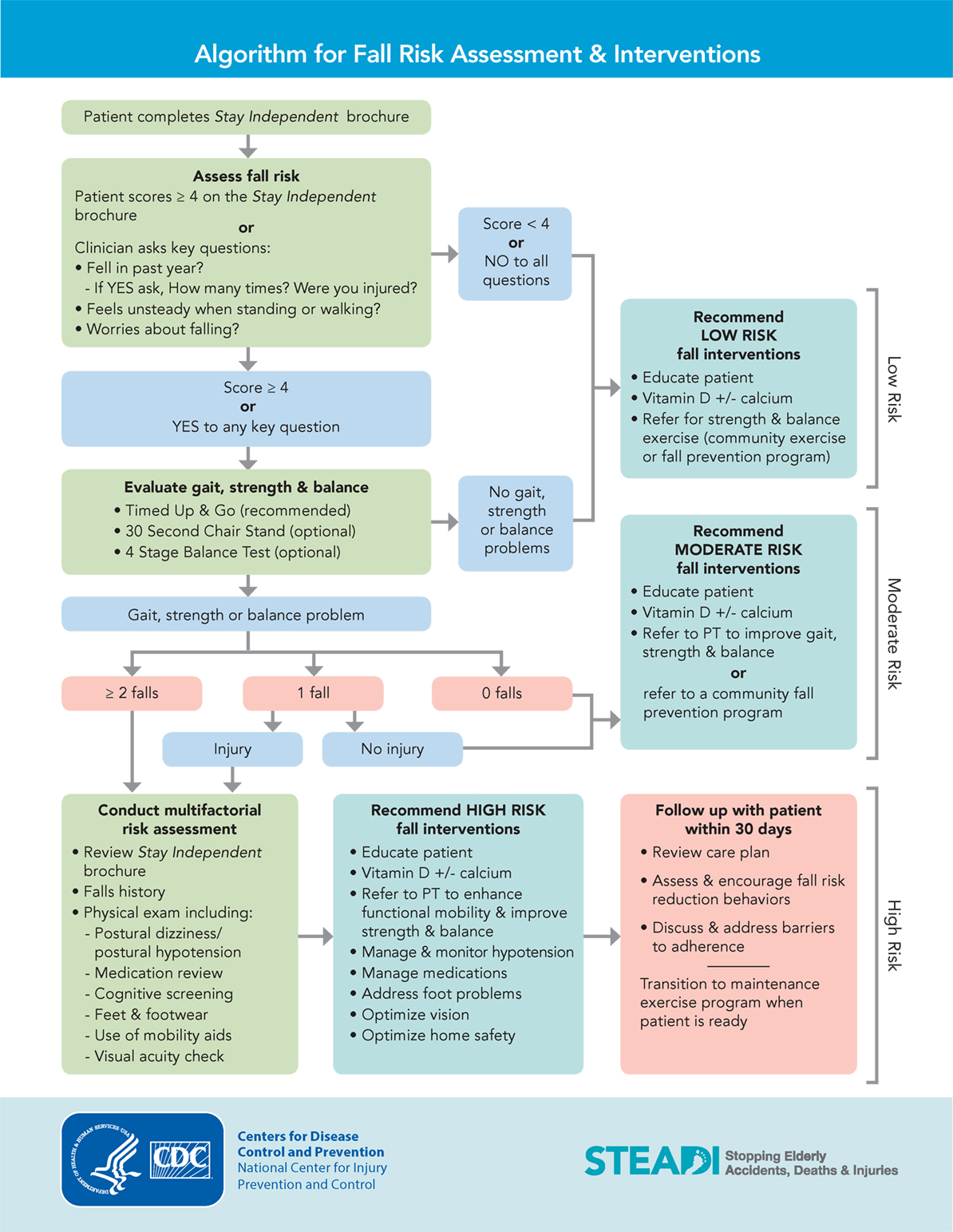9 Easy Facts About Dementia Fall Risk Explained
Table of ContentsThe Ultimate Guide To Dementia Fall RiskThe 5-Minute Rule for Dementia Fall Risk7 Simple Techniques For Dementia Fall RiskDementia Fall Risk for DummiesIndicators on Dementia Fall Risk You Need To Know
Examining fall threat assists the entire medical care team develop a safer environment for every patient. Ensure that there is an assigned area in your clinical charting system where personnel can document/reference scores and document appropriate notes connected to drop avoidance. The Johns Hopkins Loss Danger Evaluation Tool is among numerous tools your staff can utilize to assist protect against unfavorable clinical events.Patient falls in medical facilities are typical and devastating negative occasions that linger regardless of years of initiative to reduce them. Improving interaction across the evaluating nurse, treatment team, client, and person's most entailed loved ones might enhance fall prevention initiatives. A group at Brigham and Women's Medical facility in Boston, Massachusetts, sought to establish a standardized fall prevention program that centered around enhanced interaction and individual and family engagement.

The advancement group emphasized that effective application depends on person and staff buy-in, assimilation of the program right into existing process, and fidelity to program procedures. The team noted that they are grappling with how to guarantee connection in program implementation during durations of situation. Throughout the COVID-19 pandemic, as an example, an increase in inpatient drops was related to restrictions in patient engagement in addition to restrictions on visitation.
Dementia Fall Risk for Beginners
These events are typically thought about preventable. To implement the intervention, organizations need the following: Accessibility to Autumn ideas sources Fall pointers training and retraining for nursing and non-nursing personnel, consisting of brand-new nurses Nursing workflows that enable patient and household involvement to perform the drops assessment, make sure use of the prevention plan, and carry out patient-level audits.
The outcomes can be extremely destructive, typically speeding up individual decrease and causing longer hospital stays. One research study approximated stays enhanced an added 12 in-patient days after a patient fall. The Loss TIPS Program is based upon engaging people and their family/loved ones throughout three major procedures: evaluation, personalized preventative treatments, and bookkeeping to ensure that individuals are participated in the three-step fall prevention procedure.
The client analysis is based upon the Morse Fall Scale, which is a confirmed loss risk analysis tool for in-patient hospital setups. The scale consists of the six most common factors patients in hospitals drop: the client loss history, risky problems (including polypharmacy), usage of IVs and various other external gadgets, mental status, stride, and movement.
Each threat element links with one or even more actionable evidence-based treatments. The nurse produces a strategy that incorporates the interventions and shows up to the treatment group, client, and family members on a laminated poster or printed visual aid. Registered nurses create the plan while consulting with the individual and the client's family.
The Best Strategy To Use For Dementia Fall Risk
The poster functions as a communication tool with various other participants of the client's treatment group. Dementia Fall Risk. The audit part of the program includes evaluating the patient's knowledge of their risk variables and avoidance plan at the system wikipedia reference and health center degrees. Nurse champs conduct a minimum of 5 specific interviews a month with individuals and their family members to look for understanding of the fall avoidance plan

An approximated 30% of these falls lead to injuries, which can range in seriousness. Unlike other unfavorable events that require Get More Information a standardized professional response, fall prevention depends extremely on the requirements of the patient. Including the input of individuals that recognize the client ideal permits better modification. This strategy has actually shown to be a lot more reliable than fall avoidance programs that are based mostly on the production of a danger rating and/or are not adjustable.
Dementia Fall Risk Fundamentals Explained

Based on bookkeeping results, one website had 86% conformity and two sites had more than 95% compliance. A cost-benefit evaluation of the Autumn pointers program in eight healthcare facilities estimated that the program a knockout post price $0.88 per patient to implement and caused cost savings of $8,500 per 1000 patient-days in direct costs associated with the prevention of 567 tips over 3 years and eight months.
According to the technology team, organizations thinking about executing the program should carry out a readiness evaluation and falls avoidance spaces analysis. 8 In addition, organizations ought to make certain the needed infrastructure and process for implementation and develop an implementation strategy. If one exists, the company's Loss Prevention Job Pressure ought to be included in planning.
Get This Report about Dementia Fall Risk
To begin, companies should guarantee conclusion of training components by nurses and nursing aides - Dementia Fall Risk. Hospital team ought to evaluate, based upon the requirements of a healthcare facility, whether to use an electronic health record hard copy or paper variation of the fall avoidance strategy. Applying teams need to hire and train registered nurse champions and establish procedures for auditing and coverage on fall information
Personnel need to be associated with the procedure of redesigning the operations to involve patients and family in the assessment and avoidance plan procedure. Equipment needs to be in location to make sure that systems can comprehend why a fall happened and remediate the reason. More particularly, nurses must have channels to provide recurring feedback to both personnel and unit management so they can adjust and boost autumn avoidance workflows and communicate systemic issues.